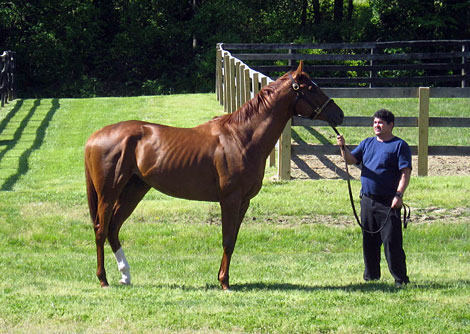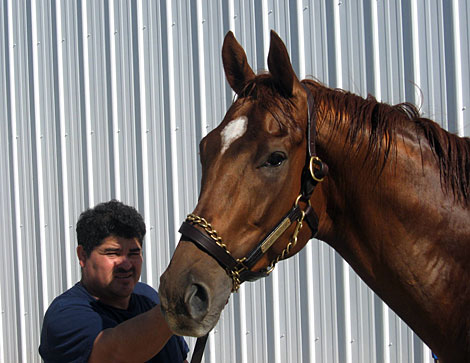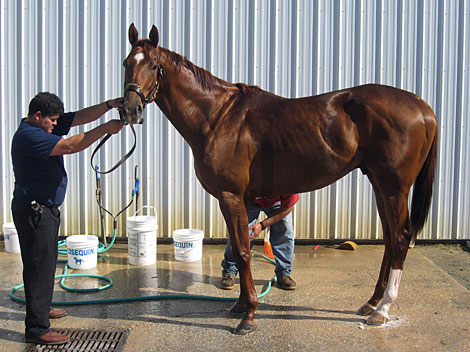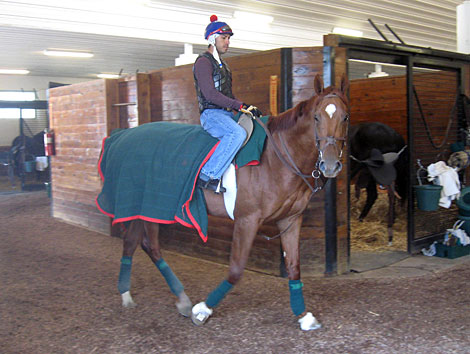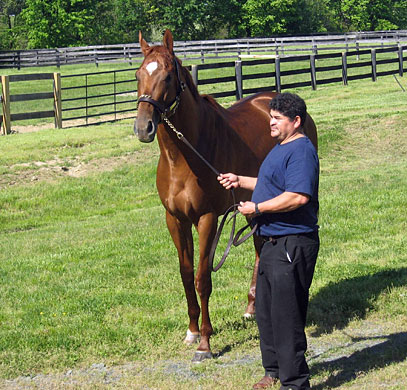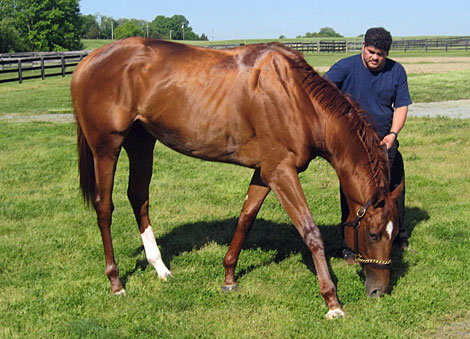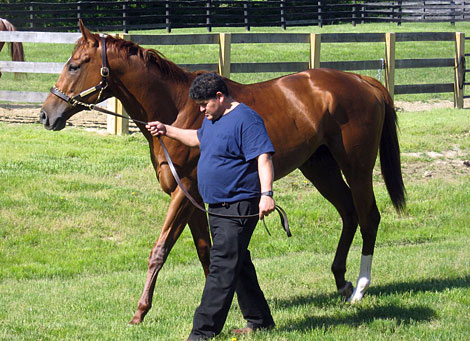The perception of greatness has changed with the times. Years ago, defeats did not diminish a horse’s greatness if the victories were plentiful enough and impressive enough to keep the defeats veiled in the background. On rare occasions, defeats actually helped define a horse’s greatness (for example Seattle Slew and Zenyatta). Horses back then earned their greatness through their number of major victories, weight carrying ability, competition, and in most cases their longevity. Defeats were regarded as steppingstones to the next victory.
For every Man o’War, Native Dancer, Secretariat, Seattle Slew, Ruffian, and Spectacular Bid, horses with near-perfect records, there was a Seabiscuit, Forego, Kelso, Gallorette, Equipoise, and John Henry – horses who became a part of the fabric of racing, despite numerous defeats. Instead of the hit-and-run careers we see now that are used mainly as marketing tools to promote stallions, we had horses who were bred to race, and race they did, often becoming household names.
After 45 years in racing, I would like to think I can identify greatness in one form or another, as subjective as that may be. History does not record every great horse in its most hallowed pages, but that doesn’t mean there aren’t horses with greatness in them. Sometimes, injuries curtail a horse’s career and prevent him or her from entering racing’s pantheon of greats.
No one is going to mention the name Animal Kingdom with horses like those mentioned above, but who can deny the greatness he has exhibited? Because of his untimely injuries and long layoffs, one can only ask the proverbial “what if?”
Owned and bred by Team Valor and trained brilliantly by Graham Motion, Animal Kingdom is the only horse ever to win the Kentucky Derby having never run on dirt. He became only the second horse in 93 years to win the Derby with as few as four career starts. His final half-mile in :47 1/5 in the Derby was the second-fastest in the history of the race; only Secretariat came home faster. He was the only horse in 55 years to win the Derby off a six-week layoff. And now he is the only American-trained horse to win the Dubai World Cup on Meydan’s Tapeta surface, and in fact is the only one to even finish in the money. He accomplished it this year, dominating his opponents, despite every other American horse on the card finishing far up the track.
He even provided jockey John Velazquez with arguably the greatest pick-up mount in the history of the Kentucky Derby. There have been other notable ones, but no jockey had ever won the Derby after picking up the mount literally the night before the race.
Even Animal Kingdom’s breeding broke new barriers on an international scale. His sire, Leroidesanimaux, became the first Brazilian-bred horse to sire a U.S. classic winner. His dam, Dalicia, became the first German-bred mare to produce a U.S. classic winner. And his broodmare sire, Acatenango, became the first German-bred broodmare sire of a U.S. classic winner.
He also turned in one of the greatest losing efforts in Breeders’ Cup history, finishing second to eventual Horse of the Year Wise Dan in the Breeders’ Cup Mile, despite encountering as much trouble as any Breeders’ Cup starter in memory. His late closing burst after finally getting clear was a sight to behold.
In his second-place finishes in the Preakness, Breeders’ Cup Mile, and Gulfstream Park Turf Handicap, he either had bad rides or bad trips, but excuses aside, he was beaten by horses with career earnings of $3.09 million, $3.5 million, and $1.8 million, respectively. In the Dubai World Cup, he defeated 11 opponents who had earned a combined $19.7 million.
Dirt, grass, Polytrack, Tapeta, it doesn’t matter. He has excelled on all of them.
I’ll never forget talking to Graham Motion outside his barn the morning of the Kentucky Derby, and the obvious concerns he had running in the Derby with so many question marks and not knowing what to expect. Motion, who was crushed over having just lost his big Derby horse, Wood Memorial winner Toby’s Corner, to injury was well aware that no horse had ever won the Derby making his dirt debut.
“I just don’t know,” he said. “The statistics are all against him, I feel good about running the horse, but it’s such an unknown. I love the horse, I love the way he worked over the dirt, and I love his attitude. He’s got everything going for him. It’s just that unknown.”
But as Jim Morrison said, “There are things known, and there are things unknown. And in between are the doors.”
Later that evening, Animal Kingdom burst through one of those doors, and awaiting him on the other side was Kentucky Derby immortality. By powering down the Churchill Downs stretch to a 2 ¾-length victory in front of a record crowd of 164,658, the unknown had become known. Racing had a new star and a legitimate Triple Crown threat.
I also recall speaking to Velazquez on the backstretch the day before the Derby. He had just lost his Derby mount following the scratch of 2-year-old champion Uncle Mo due to a then undiagnosed ailment. Two years earlier, Velazquez had seen his Derby favorite Quality Road withdrawn a week before the race because of a quarter crack, and then one year later, his heavy Derby favorite Eskendereya was withdrawn several days before the Derby with a career-ending injury.
Although disappointed and frustrated having lost three potential Derby favorites in three years, Velazquez understood that this sport can rip your heart out at any time and you have to learn to come to terms with it. He then uttered some of the most prophetic words I’ve ever heard on the racetrack.
“What can you do; it’s part of racing,” he said in the quiet of the backstretch. “One year we’ll win it when we least expect it.”
Never could he have imagined that that year would be the following day.
Robby Albarado, who was named to ride Animal Kingdom in the Derby, had suffered a broken nose after being kicked by a horse and felt he was unable to ride the day before the Derby. Motion and Irwin, uneasy about using a jockey who had not ridden for a while and had taken off his mounts the day before on Oaks Day, decided not to take any chances and they replaced Albarado with Velazquez.
“That call to Robby was a tough one to make,” Motion said. “But when he took off his mounts on Friday that was a concern, and when Johnny became available, we decided to go with him.”
The Derby gods had made an uncharacteristic 11th hour appearance on the scene. Destiny had somehow brought together Motion and Velazquez, whose families have been close friends for years.
Fate also played a major part in Animal Kingdom even being in the Derby. The plan was to run another Team Valor colt, Crimson China, who was more advanced than Animal Kingdom, in the Spiral Stakes on Polytrack at Turfway Park and run Animal Kingdom on the same card in the listed Rushaway Stakes. But when the Spiral field oversubscribed, it came down earnings to determine who would make the starting field. Animal Kingdom had earnings of $41,900, which qualified him, while Crimson China had only $28,838, which did not. So Irwin and Motion made a last-minute switch and ran Animal Kingdom in the Spiral and Crimson China in the Rushaway. While the latter could no better than second, Animal Kingdom made a spectacular run from 11th to win going away by almost three lengths. So, because of a difference in $13,062 in earnings, Animal Kingdom was now in the Kentucky Derby.
“In life, everything has to fit together,” Irwin said. “It’s nice to have the goods; it’s nice to be intelligent, but unless things go your way and you’re lucky, it’s not going to happen.”
Animal Kingdom had originally been trained by Wayne Catalano, but after the colt’s second start Irwin decided to use only one trainer and turned all his horses over to Motion, taking over a private barn at the Fair Hill Training Center where Motion already had a barn. Catalano took great interest in watching Animal Kingdom train at Churchill in the days leading up to the Derby, recalling the “big, green, backward” colt who needed a lot of time to get his act together.
When Animal Kingdom turned in a strong six-furlong work at Churchill Downs, handling the dirt beautifully, confidence began to build in the Team Valor camp.
The colt did not escape the eagle eye of Bob Baffert, who had watched the work. Standing by the gap several days later, he saw Animal Kingdom gallop by with those long powerful strides, and said three simple, but emphatic, words: “That’s the horse.”
As history records, Animal Kingdom powered down the stretch, despite racing greenly, to win by 2 ¾ lengths at odds of 20-1. A stunned, but ecstatic Velazquez could not believe the incredible turn of events and the new overnight star he had latched on to. All this green, inexperienced horse, who had never run on dirt, managed to do was come home his last two quarters in a spectacular :23 2/5 and :23 4/5.
In the Preakness, Animal Kingdom broke a bit slowly and found himself back in 13th, 18 lengths off the pace; much too far back over a track like Pimlico. Veleazquez asked for his run on the far turn, and Animal Kingdom began picking off horses, but simply had too much ground to make up on the brilliant and classy Shackleford. After being forced to go six-wide at the top of the stretch, he began cutting into Shackleford’s lead, but came up a half-length short. His final three-sixteenths in :18 1/5 was either the fastest or one of the fastest in the history of the race.
“It wasn’t meant to be this time,” Motion said. “He came pretty darn close, though. He got a lot of dirt kicked in his face today, which was different from the Derby. This is a remarkable horse. What he accomplished in such a short period of time is extraordinary.”
The fates were even crueler in the Belmont Stakes. First off, the track came up sloppy. At the start, Mucho Macho Man was crowded by longshot Isn’t He Perfcect and shied away from him. When he did, he smacked into Animal Kingdom, who then clipped heels and stumbled badly, nearly unseating Velazquez, who lost his left iron. By the time he recovered and got Animal Kingdom back in stride, he was last in the field of 12, about 15 lengths off the pace. Going wide into the far turn at Belmont and getting hung wide on that big turn normally spells disaster. Getting hung wide on a sloppy track and blowing by horses in and unheard of :23 2/5 makes it virtually impossible to sustain a move like that.
Animal Kingdom, finally feeling the effects of his disastrous trip, began spinning his wheels in the stretch, eventually finishing sixth. Soon after, it was discovered he had suffered a hairline fracture of his hind leg, which likely occurred when he was roughed up at the start. Follow-up X-rays revealed a slab fracture in the same leg. The colt underwent surgery, in which two screws were inserted, and he didn’t return to the races for another eight months.
During that time, he made several visits to the Fair Hill Equine Therapy Center just up the road, where he spent time in the hyperbaric chamber. As he neared his return, he continued his rehab using the facility’s AquaPacer and cold saltwater spa.
“He’s such a classy horse,” said Bruce Jackson, who founded and runs the Therapy Center. “He always had an air about him and knew he was something special. Despite his setbacks, he’s a very tough, sturdy horse. He is some animal, he really is. You always felt he was allowing you to be around him rather than the other way around.”
Animal Kingdom returned with a stunning victory in an allowance race on the grass as a prep for the Dubai World Cup. But his comeback was brief, as he came out of the race with a stress fracture in the same hind leg that would sideline him for another 8 1/2 months.
It came as a surprise when Motion announced that Animal Kingdom would return in the Breeders’ Cup Mile against some of the world’s best milers, including eventual Horse of the Year Wise Dan and top-class Europeans Excelebration and the French filly Moonlight Cloud. To attempt this without a prep race was a bold move, but Motion had confidence in the horse and his own ability to get him ready off such a long layoff.
Several weeks before the Breeders’ Cup, I ran into Motion outside his Fair Hill barn and he discussed his reason for bringing Animal Kingdom back in the Breeders’ Cup off a 259-day layoff and only one allowance race in 17 months. He said he was inclined not to rush to get a prep race in him, feeling the colt had the ability to run a big race first time back and he didn’t want to risk having him regress off that effort in the Breeders’ Cup.
That he was even able to make it back after two fractures and two long layoffs was amazing enough. Although he finished second behind Wise Dan in course-record time, it was his performance that provided the single most memorable moment of the entire Breeders’ Cup for me.
Animal Kingdom’s spectacular burst of speed after seeming hopelessly beaten left me in awe of this horse’s ability and fortitude and the training job turned in by Motion. As the field came to the head of the stretch, I had already resigned myself to the fact that Animal Kingdom was going to get nothing and would be extremely lucky to finish fourth or even fifth.
His troubles started after turning down the backstretch when Moonlight Cloud made an early run on his outside, trapping him down on the rail behind Willcox Inn. He tried to move with the French filly, but had nowhere to go and nearly ran up on Willcox Inn’s heels, steadying sharply and dropping about two lengths farther back and some eight lengths behind the pacesetting Obviously, who was being tracked by Suggestive Boy. Wise Dan, racing in third, was getting the perfect trip in the clear about two lengths off the lead.
Rafael Bejarano, who was not exactly having his best day, rushed him up right behind a wall of horses, some four lengths behind the leader. With Bejarano unable to ride him because of the traffic in front of him, Animal Kingdom had his momentum stopped again just as the first three kicked in for their final run. Animal Kingdom now found himself six lengths off the lead and down on the inside again as they approached the head of the stretch.
Turning for home, Animal Kingdom was pinned down on the rail with nowhere to go and only one horse behind him. Wise Dan had dead aim on Obviously and charged to the lead, with Animal Kingdom still trapped down on the inside behind Mr. Commons and his outside path sealed off by Excelebration. Animal Kingdom now had his head cocked to the outside as if he were looking for a way out. All Bejarano could do at this point was just sit on him and wait.
Winning was out of the question, as Wise Dan was beginning to draw clear of the field. At the eighth pole, Animal Kingdom was still back in sixth with nowhere to go. Finally, a hole opened between Mr. Commons and a rallying Excelebration and Animal Kingdom showed a burst of speed unlike anything I’ve seen in a long time. He exploded past Excelebration and then Obviously and hit the wire 1 1/2 lengths behind Wise Dan, who was had broken the Santa Anita course record for a mile.
All Animal Kingdom did was run a mile in 1:31 4/5 off nearly a nine-month layoff, coming home his final eighth in a breathtaking :10 4/5 and final quarter in :22 1/5, despite not being able to run from the head of the stretch to inside the sixteenth pole.
It was heartwarming to hear the round of applause he was given as he returned following the race.
Several weeks after the Breeders’ Cup, Team Valor sold majority interest in Animal Kingdom’s breeding rights to the Australia-based Arrowfield Stud, where he will begin his stud career in September. Part of the agreement was that Team Valor continued to call the shots regarding the horse’s next three races – one race in Florida, the Dubai World Cup, and likely the Queen Anne Stakes at Royal Ascot, although John Messara of Arrowfield has veto power regarding the Ascot race. Irwin wanted to assure the possibility of running at Ascot, but did not want to tie Arrowfield's hands if they were uncomfortable with it, so he left the final decision up to them.
After being given three months off, Animal Kingdom returned in the Gulfstream Park Turf Handicap as a prep for the Dubai World Cup, a race Irwin had been trying to win for several years. This time, he ran up against Point of Entry, winner of the Man o’ War, Sword Dancer, and Joe Hirsch Turf Classic and a fast-closing second in the Breeders’ Cup Turf. With Joel Rosario riding him for the first time, he was rushed up prematurely and wound up battling for the lead way too early. He tried to fight off Point of Entry in the stretch, but had to settle for second, beaten 1 1/4 lengths. Although Rosario’s ride was counter-productive to the horse’s best running style, he did learn a lot about him and the early move and stiff test were just what the horse needed to set him up for the World Cup.
The event started out disastrously for the Americans and continued to get worse, with no one even coming close in the earlier races. Since the switch to Tapeta in 2010, not s single American horse was able to finish in the money in the World Cup.
Animal Kingdom would change all that. At Fair Hill, which has a Tapeta track, Bruce Jackson brought a large TV in the office and the majority of Motion’s crew came over to watch the race.
Although fellow Americans Royal Delta and Dullahan would finish in the rear of the field, Animal Kingdom would make history yet again. Breaking from post 12, Rosario was able to keep him in the clear, and while he did go about four-wide into the first turn, Animal Kingdom was running smoothly and settled in fourth, within striking distance of the pace-setting Royal Delta. Down the backstretch, he moved up into second and looked to be in total control. When Rosario asked him nearing the head of the stretch, he powered past Royal Delta and quickly opened a clear lead, changing leads right on cue. He was moving with such authority, it was obvious early in the stretch that no one was going to catch him.
Red Cadeaux made a big run along the inside, but Animal Kingdom was never in any danger of being caught, winning by two lengths. It was another 4 3/4 lengths back to Planteur in third. Royal Delta and Dullahan finished 10th and 11th, respectively.
A week later, Darley purchased 29% of Animal Kingdom, with their Kentucky farm to serve as the horse's Northern Hemisphere home. So, America has not seen the last of Animal Kingdom after all.
But for now it is time to temporarily bid farewell to one of the most gifted and mentally tough Thoroughbreds I’ve ever been around. Animal Kingdom likely will make his next start in the Queen Anne Stakes over a testing mile at Royal Ascot. Just another of the many challenges he has had to face.
Whatever he accomplishes from this point on, in England or in a final race in Australia, the name Animal Kingdom will always stir memories of a special horse who kept persevering and looking for new worlds to conquer.
Animal Kingdom at Fair Hill - All photos by Steve Haskin
